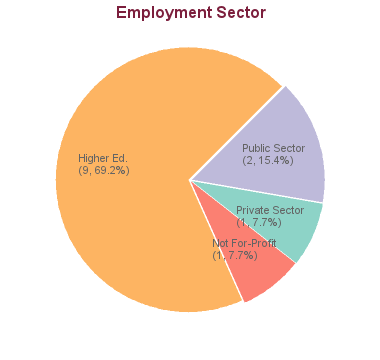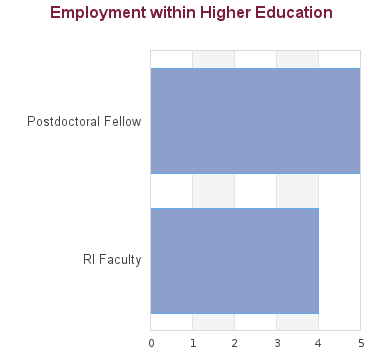Canadian Immigration Updates
Review details about the recently announced changes to study and work permits that apply to master’s and doctoral degree students. Read more
Applicant Information
We are excited to have received Ministry approval for the new Women+ and Children’s Health Sciences (WACH) program which will replace our current Reproductive and Developmental Sciences (RDS) graduate program starting with the September 2022 intake. If you have been considering applying to the RDS program, please review the new WACH graduate program which will be able to accommodate similar research endeavors.
Overview
The goal of the Graduate Program in Reproductive and Developmental Sciences is to provide students with a broad knowledge of mammalian reproductive and developmental biology, as well as with in depth expertise in at least one area of research, including:
- reproductive and molecular endocrinology
- immunology of reproduction
- maternal adaptations to pregnancy
- women’s mental health
- gynecologic cancers
- prostate cancer
- fertilization and early embryonic development
- placental development
- perinatal metabolism
- fetal/neonatal physiology and pathophysiology
- perinatal epidemiology
Other areas of research on human health and disease as it relates to male and female reproduction are also possible, including perinatal and postnatal health topics.
Basic science, clinical or epidemiological research projects are possible.
What makes the program unique?
The RDS program is the only graduate program in Canada that is based in a Department of Obstetrics and Gynecology. RDS students thus have the opportunity to interact with both basic science and clinical research faculty, which can lead to the formulation of research projects that address important clinical issues in women (e.g. ovarian cancer, preeclampsia). Moreover, the location of the program in the teaching hospitals in Vancouver facilitates the collection of human samples (e.g. placental or ovarian tissue, sperm and testes tissue) that can be used in thesis research projects.
Program Structure
The PhD program can involve coursework in addition to the manadatory seminar course, but this is not always the case. A comprehensive examination and thesis-based research which produces new research findings, as well as defense of the thesis, are required.
Quick Facts
Admission Information & Requirements
1) Check Eligibility
Minimum Academic Requirements
The Faculty of Graduate and Postdoctoral Studies establishes the minimum admission requirements common to all applicants, usually a minimum overall average in the B+ range (76% at UBC). The graduate program that you are applying to may have additional requirements. Please review the specific requirements for applicants with credentials from institutions in:
Each program may set higher academic minimum requirements. Please review the program website carefully to understand the program requirements. Meeting the minimum requirements does not guarantee admission as it is a competitive process.
English Language Test
Applicants from a university outside Canada in which English is not the primary language of instruction must provide results of an English language proficiency examination as part of their application. Tests must have been taken within the last 24 months at the time of submission of your application.
Minimum requirements for the two most common English language proficiency tests to apply to this program are listed below:
TOEFL: Test of English as a Foreign Language - internet-based
Overall score requirement: 100
Reading
22
Writing
22
Speaking
22
Listening
22
IELTS: International English Language Testing System
Overall score requirement: 7.0
Reading
7.0
Writing
7.0
Speaking
7.0
Listening
7.0
Other Test Scores
Some programs require additional test scores such as the Graduate Record Examination (GRE) or the Graduate Management Test (GMAT). The requirements for this program are:
The GRE is not required.
Prior degree, course and other requirements
Prior Degree Requirements
Students admitted to the PhD degree program normally possess a master’s degree in biological science or related area, or its academic equivalent (MD, DVM, DDS), with clear evidence of research ability or potential.
2) Meet Deadlines
3) Prepare Application
Transcripts
All applicants have to submit transcripts from all past post-secondary study. Document submission requirements depend on whether your institution of study is within Canada or outside of Canada.
Letters of Reference
A minimum of three references are required for application to graduate programs at UBC. References should be requested from individuals who are prepared to provide a report on your academic ability and qualifications.
Statement of Interest
Many programs require a statement of interest, sometimes called a "statement of intent", "description of research interests" or something similar.
Supervision
Students in research-based programs usually require a faculty member to function as their thesis supervisor. Please follow the instructions provided by each program whether applicants should contact faculty members.
Instructions regarding thesis supervisor contact for Doctor of Philosophy in Reproductive and Developmental Sciences (PhD)
RDS faculty members are listed on the "Prospective Supervisors" page of the program's website. You will be asked to upload a signed Memo of Acceptance (provided by the program) from your confirmed supervisor with the application.
Citizenship Verification
Permanent Residents of Canada must provide a clear photocopy of both sides of the Permanent Resident card.
4) Apply Online
All applicants must complete an online application form and pay the application fee to be considered for admission to UBC.
Research Information
Research Focus
Reproductive and molecular endocrinology, immunology of reproduction, maternal adaptations to pregnancy, women’s mental health, gynecologic cancers, prostate cancer, fertilization and early embryonic development, placental development, perinatal metabolism, fetal/neonatal physiology and pathophysiology, perinatal epidemiology.
Research Facilities
Research activities take place in the BC Women’s Hospital, the main obstetrics and gynaecology hospital in BC, and in one or both of the on-campus research institutes: the BC Children’s Hospital Research Institute, and the Women’s Health Research Institute. In addition, research may be carried out on the UBC Point Grey campus, at Vancouver General Hospital, St. Paul’s Hospital or the BC Cancer Agency. All sites possess modern, well-equipped laboratories for basic science research. There are also facilities for conducting research on human subjects, and for clinical and epidemiological research. Students whose research involves human reproductive biology may have the opportunity to work with clinical members of the Department of Obstetrics & Gynaecology. There are also opportunities to collaborate with the BC Support Unit for students whose projects involve patient engagement.
Tuition & Financial Support
Tuition
| Fees | Canadian Citizen / Permanent Resident / Refugee / Diplomat | International |
|---|---|---|
| Application Fee | $116.25 | $168.25 |
| Tuition * | ||
| Installments per year | 3 | 3 |
| Tuition per installment | $1,875.34 | $3,294.66 |
| Tuition per year (plus annual increase, usually 2%-5%) | $5,626.02 | $9,883.98 |
| Int. Tuition Award (ITA) per year (if eligible) | $3,200.00 (-) | |
| Other Fees and Costs | ||
| Student Fees (yearly) | $1,144.10 (approx.) | |
| Costs of living | Estimate your costs of living with our interactive tool in order to start developing a financial plan for your graduate studies. | |
All fees for the year are subject to adjustment and UBC reserves the right to change any fees without notice at any time, including tuition and student fees. Tuition fees are reviewed annually by the UBC Board of Governors. In recent years, tuition increases have been 2% for continuing domestic students and between 2% and 5% for continuing international students. New students may see higher increases in tuition. Admitted students who defer their admission are subject to the potentially higher tuition fees for incoming students effective at the later program start date. In case of a discrepancy between this webpage and the UBC Calendar, the UBC Calendar entry will be held to be correct.
Financial Support
Applicants to UBC have access to a variety of funding options, including merit-based (i.e. based on your academic performance) and need-based (i.e. based on your financial situation) opportunities.
Program Funding Packages
Students in the RDS program have been successful in receiving the Vanier Graduate Scholarship, CIHR doctoral awards, and affiliated awards.
The minimum funding requirement for PhD students is $24,000 per annum, paid by a Graduate Research Assistantship. Students with external awards totalling less than $24,000 must be topped up to at least the minimum funding from their supervisor's grant.
Average Funding
- 1 student received Teaching Assistantships valued at $17,081.
- 2 students received Research Assistantships. Average RA funding based on 2 students was $15,305.
- 2 students received internal awards. Average internal award funding based on 2 students was $1,565.
Review methodology
Scholarships & awards (merit-based funding)
All applicants are encouraged to review the awards listing to identify potential opportunities to fund their graduate education. The database lists merit-based scholarships and awards and allows for filtering by various criteria, such as domestic vs. international or degree level.
Graduate Research Assistantships (GRA)
Many professors are able to provide Research Assistantships (GRA) from their research grants to support full-time graduate students studying under their supervision. The duties constitute part of the student's graduate degree requirements. A Graduate Research Assistantship is considered a form of fellowship for a period of graduate study and is therefore not covered by a collective agreement. Stipends vary widely, and are dependent on the field of study and the type of research grant from which the assistantship is being funded.
Graduate Teaching Assistantships (GTA)
Graduate programs may have Teaching Assistantships available for registered full-time graduate students. Full teaching assistantships involve 12 hours work per week in preparation, lecturing, or laboratory instruction although many graduate programs offer partial TA appointments at less than 12 hours per week. Teaching assistantship rates are set by collective bargaining between the University and the Teaching Assistants' Union.
Graduate Academic Assistantships (GAA)
Academic Assistantships are employment opportunities to perform work that is relevant to the university or to an individual faculty member, but not to support the student’s graduate research and thesis. Wages are considered regular earnings and when paid monthly, include vacation pay.
Financial aid (need-based funding)
Canadian and US applicants may qualify for governmental loans to finance their studies. Please review eligibility and types of loans.
All students may be able to access private sector or bank loans.
Foreign government scholarships
Many foreign governments provide support to their citizens in pursuing education abroad. International applicants should check the various governmental resources in their home country, such as the Department of Education, for available scholarships.
Working while studying
The possibility to pursue work to supplement income may depend on the demands the program has on students. It should be carefully weighed if work leads to prolonged program durations or whether work placements can be meaningfully embedded into a program.
International students enrolled as full-time students with a valid study permit can work on campus for unlimited hours and work off-campus for no more than 24 hours a week during academic sessions.
A good starting point to explore student jobs is the UBC Work Learn program or a Co-Op placement.
Tax credits and RRSP withdrawals
Students with taxable income in Canada may be able to claim federal or provincial tax credits.
Canadian residents with RRSP accounts may be able to use the Lifelong Learning Plan (LLP) which allows students to withdraw amounts from their registered retirement savings plan (RRSPs) to finance full-time training or education for themselves or their partner.
Please review Filing taxes in Canada on the student services website for more information.
Cost Estimator
Applicants have access to the cost estimator to develop a financial plan that takes into account various income sources and expenses.
Career Outcomes
20 students graduated between 2005 and 2013. Of these, career information was obtained for 13 alumni (based on research conducted between Feb-May 2016):


RI (Research-Intensive) Faculty: typically tenure-track faculty positions (equivalent of the North American Assistant Professor, Associate Professor, and Professor positions) in PhD-granting institutions
TI (Teaching-Intensive) Faculty: typically full-time faculty positions in colleges or in institutions not granting PhDs, and teaching faculty at PhD-granting institutions
Term Faculty: faculty in term appointments (e.g. sessional lecturers, visiting assistant professors, etc.)
Sample Employers in Higher Education
University of British Columbia (2)Hong Kong University of Science and Technology
Chungnam National University
Gachon University
University of Kentucky
University of Texas
Kyung Hee University
University of Chicago
Sample Employers Outside Higher Education
BC Cancer Agency (2)Izumi Municipal Hospital
National Cancer Centre Singapore
Sample Job Titles Outside Higher Education
Postdoctoral FellowAttending Chief Physician
Scientist
Senior Research Fellow
PhD Career Outcome Survey
You may view the full report on career outcomes of UBC PhD graduates on outcomes.grad.ubc.ca.Disclaimer
These data represent historical employment information and do not guarantee future employment prospects for graduates of this program. They are for informational purposes only. Data were collected through either alumni surveys or internet research.Enrolment, Duration & Other Stats
These statistics show data for the Doctor of Philosophy in Reproductive and Developmental Sciences (PhD). Data are separated for each degree program combination. You may view data for other degree options in the respective program profile.
ENROLMENT DATA
| 2023 | 2022 | 2021 | 2020 | 2019 | |
|---|---|---|---|---|---|
| Applications | 0 | 1 | 9 | 5 | 9 |
| Offers | 0 | 1 | 5 | 1 | 5 |
| New Registrations | 0 | 0 | 3 | 1 | 5 |
| Total Enrolment | 5 | 6 | 19 | 15 | 18 |
Completion Rates & Times
Disclaimer
Research Supervisors
Supervision
Students in research-based programs usually require a faculty member to function as their thesis supervisor. Please follow the instructions provided by each program whether applicants should contact faculty members.
Instructions regarding thesis supervisor contact for Doctor of Philosophy in Reproductive and Developmental Sciences (PhD)
RDS faculty members are listed on the "Prospective Supervisors" page of the program's website. You will be asked to upload a signed Memo of Acceptance (provided by the program) from your confirmed supervisor with the application.
Advice and insights from UBC Faculty on reaching out to supervisors
These videos contain some general advice from faculty across UBC on finding and reaching out to a supervisor. They are not program specific.
Doctoral Citations
| Year | Citation |
|---|---|
| 2015 | Actions of sex steroid hormones in humans are regulated by a transporter protein in the blood. Dr. Wu's research revealed how genetic variations alter production and functions of this protein. In the era of personalized medicine, his research may improve current counselling, diagnosis, prognosis, and treatment of endocrine or metabolic disorders. |
| 2015 | Dr. Li studied the way in which the implantation of human placenta is regulated by a protein named activin. That protein is found where the fetus connects with the mother. The findings provide insights into the biology of placenta implantation, and can improve the diagnosis and treatment methods used in pregnancies with dysfunctional placenta. |
| 2015 | Dr. Payne developed a simple model for managing high-risk pregnancies in Africa and South Asia. Using mobile phones, community health workers in under-resourced countries can safely manage pregnancies complicated by high blood pressure. This mobile application has been used to manage thousands of pregnancies with demonstrated health improvements. |
| 2014 | Dr. Benton studied biomarkers in two serious pregnancy complication: pre-eclampsia and fetal growth restriction. Her studies identified a protein in the mother's blood that identifies placenta dysfunction, a critical cause of these complications. New blood tests for diagnosing placental dysfunction will improve clinical care of mothers and babies. |
| 2014 | Dr. Chang showed that growth factors derived from the ovary may regulate theovarian function by cell to cell interaction. He found that these factors play significant roles in the regulation of human ovulation. These findings provide important insights into ovarian biology, and may lead to the development of new approaches for increasing fertility. |
| 2014 | Dr. Zhang conducted research into the causes of ovarian cancer. She discovered that homeobox B4, a developmental gene, suppressed invasion of human epithelial ovarian cancer cells via CD44, a cell surface adhesive molecule. This research is the first to demonstrate the role of homeobox B4 in epithelial ovarian cancer. |
| 2014 | Dr. Peng studied reproductive sciences in UBC's Department of Obstetrics and Gynaecology. He examined the importance of the gonadotropin-releasing hormone in maintaining early human pregnancy and placenta growth. His findings help us understand the mechanism of embryo implantation and may benefit women with infertility or other pregnancy-related issues. |
| 2014 | Dr. Nguyen studied newborns whose mothers had taken the anti-depression drug, Fluoxetine, during pregnancy. She found that the problems these babies experienced were due to alterations in fetal brain development, rather than the toxicity of the drug. This research provides information about the effects of depression medication taken during pregnancy. |
| 2013 | Dr. Cheng investigated how serous borderline ovarian tumors progress to invasive low-grade serous ovarian carcinomas which have significantly worse prognosis and survival. He found that loss of a cell to cell adhesion molecule, E-cadherin, plays an important role during this progression. This research helps us to better understand this rare disease. |
| 2012 | Dr. So studied novel tumor-suppressing proteins in ovarian cancer. He found that they could inhibit cancer cell invasion through maintaining intercellular adhesion, which is important information for ovarian cancer metastasis and developing therapeutics against ovarian cancer. |
Pages
Sample Thesis Submissions
Further Information
Specialization
Reproductive and Developmental Sciences provides students with a broad knowledge of mammalian reproductive and developmental biology, as well as with in-depth expertise in at least one area of research, including reproductive and molecular endocrinology, immunology of reproduction, fertilization and early embryonic development, perinatal metabolism, and fetal neonatal physiology.
Program Website
Faculty Overview
Academic Unit
Program Identifier
Departments/Programs may update graduate degree program details through the Faculty & Staff portal. To update contact details for application inquiries, please use this form.

Considering Vancouver as your next home?
This city won’t disappoint. It has it all: sea, parks, mountains, beaches and all four seasons, including beautiful summers and mild, wet winters with snow.




